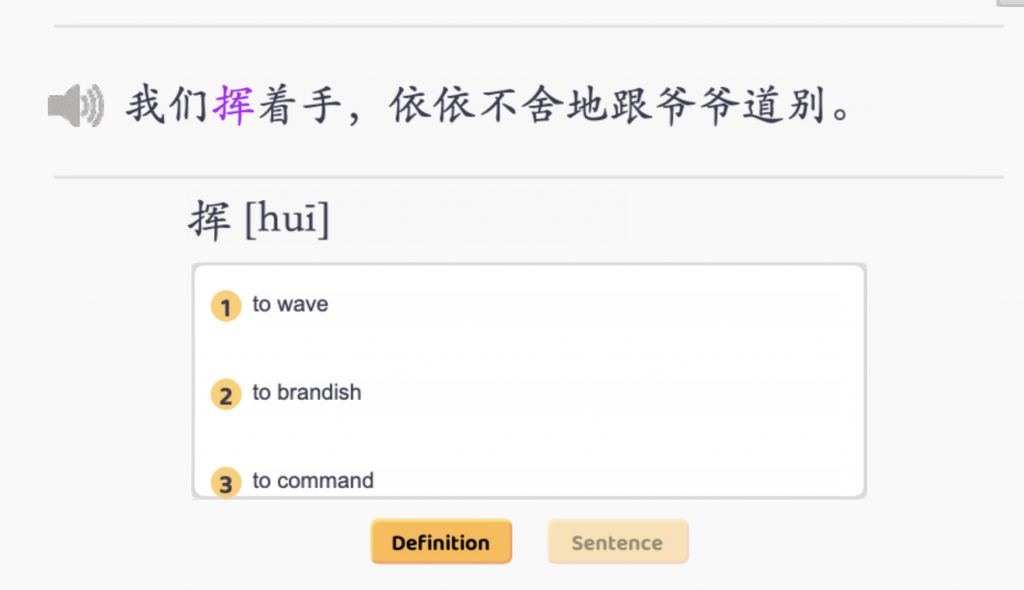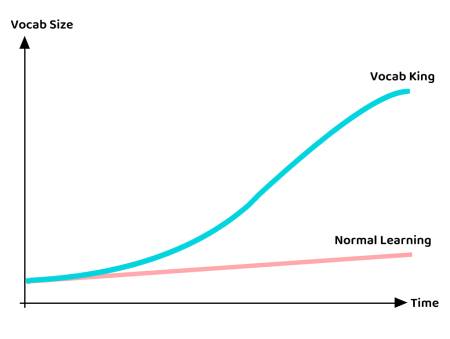A common way parents try to help their child in Chinese is to buy them tons of assessment books and ten-year series. But is this the best way to help your child? In this post, we explore the shortcomings of assessment books and how to fix them. Also, if you haven’t already seen it, we were featured on Talking Point – “Mother Tongue: How Can We Get It Right”, and please feel free to check out the video below.
The problem with assessment books
To start off, the last thing kids want to do is revise Chinese, and it takes a lot of cajoling to get them to do the questions. But let’s say you convinced your child to do the assessment book. You soon run into the main problem – what happens if a child gets a question wrong?
Let’s assume your child gets the following question wrong because he or she doesn’t recognise the word “挥”. Showing the correct answer doesn’t help because the root problem is not understanding what “挥” means. Even if your child memorises the correct answer, the moment that question changes slightly, he or she will likely get it wrong in an exam.

Assessment books don’t help students learn from their mistakes
Unlike Math or Science, Chinese questions tend to be straightforward – if you recognise every word in a question, you will most likely get it correct. While some sections like comprehension do require exam techniques, the earlier sections are basically a simple test of Vocab. Going back to the previous example – if a child knows that “挥” means to wave, then the answer is easy.
Conversely, if your child gets the question wrong, checks the answer BUT doesn’t check the meaning of “挥”, he or she isn’t actually learning.
That’s the big problem with assessment books – they don’t help a child learn from their mistakes.
Enter SmartHelp
SmartHelp is a new tool in our learning portal (VocabKing) we created to help students easily learn from their mistakes, by focusing on the root of the problem – Vocab.
We asked ourselves – if we were in a classroom, how would a teach help your child learn?
In our classroom, a teacher would first explain that “挥” means to wave, and thus the correct answer is to “say goodbye to grandpa” (依依不舍地跟爷爷道别). Once a child can recognise every word in a passage, it’s far easier to understand why a child got it wrong.
Of course, a good teacher wouldn’t stop there – she would take this opportunity to expose your child to other usages of “挥” through example sentences (造句) and vocab extensions (词语搭配), because a) there’s no guarantee that the next time 挥 appears in an exam, it will be in this exact context, and b) students need a broad vocabulary to excel.
Thus, if your child gets a question wrong while revising on our platform, we don’t just show the correct answer. We bring them to a revision page, where they can click on the specific words they don’t recognise to see its meaning, example sentence and listen to an audio read-aloud. Essentially, SmartHelp mirrors how a teacher would actually teach, by first focusing on the unknown words that caused a child to get the question wrong, and then extend on it to further build Vocab.

Add words to wordlist for auto-revision
Question: if your child uses SmartHelp to lookup and learn the word “挥” for the first time, what is the likelihood that he or she will remember it next week?
Very unlikely.As we explained previously, this is due to the “Forgetting Curve” – when we learn something, we forget half of it within a day, and almost all of it by next week. To beat the “Forgetting Curve” villain, we need to revise it several times.
That’s why SmartHelp not only helps your child learns the word for the first time, but helps you actually lock it in long-term memory. Simply add unknown words* to your wordlist with one click, and our AI algorithm will automatically keep testing it in Pet Battle or Daily Challenge until your child has learned it.
Through SmartHelp, your child will be able to grow his or her Vocabulary much faster than normal learning – simply add unknown or forgotten words to the wordlist, and let our system handle the rest.

How does SmartHelp benefit parents?
SmartHelp isn’t just about helping students learn faster – it’s also about saving parents time.
Many parents struggle with reading Chinese, especially passages that contain “out-of-syllabus” words. And even if parents are Chinese literate, sections like Comprehension, Composition and 便条 require specific techniques that most parents have long forgotten. The last thing most parents want to do is to teach their children Chinese.
Your child can drive his or her own learning through SmartHelp, while our Pet Battle games and motivating rewards are designed for self-directed learning. And yes, our materials are fully aligned with the MOE syllabus so you know that practising on VocabKing will help your child with school exams, assessments and homework!
VocabKing and SmartHelp are available for free if you are attending KidStartNow’s weekly enrichment classes. Or if you already have other enrichment lessons and are interested in VocabKing as a supplement, we provide 7-day free trials. Simply sign up here or whatsapp +65-9820-7272 for more information.







